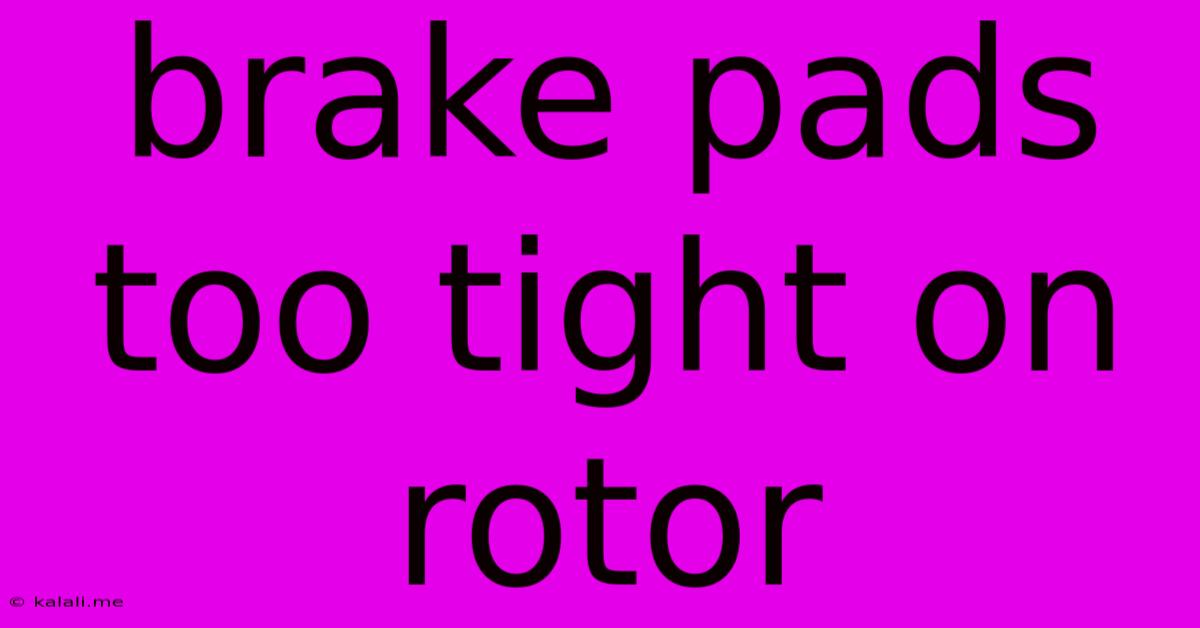Brake Pads Too Tight On Rotor
Kalali
Jun 07, 2025 · 3 min read

Table of Contents
Brake Pads Too Tight on Rotor: Causes, Symptoms, and Solutions
Are your brakes making noise? Feeling a bit grabby or hesitant? One potential culprit could be brake pads that are too tight against the rotor. This article will delve into the causes, symptoms, and solutions for this common brake problem, helping you diagnose and fix the issue safely and efficiently.
What Happens When Brake Pads Are Too Tight?
When brake pads are too tightly pressed against the rotor, several problems can arise. Constant friction generates excessive heat, leading to premature wear on both the pads and the rotors. This can result in warped rotors, reduced braking performance, and a noticeable squealing or grinding noise. Furthermore, the extra friction can place undue stress on other brake system components.
Common Causes of Tight Brake Pads:
Several factors can contribute to brake pads being too tight against the rotor:
-
Caliper Piston Issues: A seized or sticking caliper piston is a common cause. The piston may not retract fully, keeping constant pressure on the brake pads. This can be due to corrosion, debris, or a faulty piston seal.
-
Caliper Guide Pins: Worn or seized caliper guide pins prevent the caliper from moving freely. This restricts the caliper's ability to retract, maintaining pressure on the brake pads.
-
Brake Pad Wear Sensors: While designed to indicate low pad material, a faulty or incorrectly installed wear sensor can sometimes interfere with proper pad retraction.
-
Incorrect Installation: Improper installation of the brake pads or calipers can lead to misalignment and excessive pressure on the rotor.
-
Damaged or Bent Brake Components: A bent caliper bracket or other damaged components can also contribute to this issue.
Recognizing the Symptoms:
Several symptoms point towards brake pads being too tight on the rotor:
-
Squealing or Grinding Noises: A persistent squealing or grinding sound, especially when braking lightly or at low speeds, is a tell-tale sign.
-
Reduced Braking Performance: The brakes might feel spongy, grabby, or unresponsive.
-
Excessive Heat Generation: The brake rotors may become excessively hot, even after short driving periods. This can be felt by carefully touching the rotor (use caution, as they can be extremely hot!).
-
Visible Wear on Brake Pads and Rotors: Uneven wear patterns on the brake pads and rotors are indicative of a problem.
How to Fix the Problem:
Addressing this issue often requires mechanical expertise. While some minor adjustments might be possible for experienced DIYers, it’s crucial to prioritize safety. If you're not comfortable working on brakes, seek professional assistance from a qualified mechanic.
Here's a general overview of potential solutions:
-
Inspect and Clean the Caliper: Carefully inspect the caliper for any signs of corrosion, damage, or seizing. Clean the caliper thoroughly, ensuring all moving parts are free from debris.
-
Lubricate Guide Pins: If present, lubricate the caliper guide pins with a suitable high-temperature brake lubricant. This allows for smoother caliper movement.
-
Check and Replace the Caliper Piston: If the piston is seized or damaged, it will need to be replaced.
-
Replace Worn Brake Pads: Worn or damaged brake pads should always be replaced.
-
Inspect and Replace Rotors (if warped): Warped rotors need to be replaced or machined to ensure proper braking performance.
Prevention is Key:
Regular brake maintenance is essential to prevent this issue:
-
Regular Inspections: Periodically inspect your brake system for any signs of wear or damage.
-
Professional Service: Schedule routine brake inspections and servicing by a qualified mechanic.
-
High-Quality Parts: Use high-quality brake pads and other components to ensure optimal performance and longevity.
Addressing brake pad issues promptly is critical for safety. By understanding the causes, symptoms, and solutions, you can maintain your vehicle's braking system and ensure safe driving conditions. Remember, when in doubt, consult a qualified mechanic.
Latest Posts
Latest Posts
-
Where Does L Cysteine For Bread Come From
Jun 07, 2025
-
How To Adjust Well Pump Pressure Switch
Jun 07, 2025
-
How Many Wives Did Jacob Have
Jun 07, 2025
-
How To Play Spotify With The F8 Key On Maf
Jun 07, 2025
-
Do Not Damage The Oil And The Wine
Jun 07, 2025
Related Post
Thank you for visiting our website which covers about Brake Pads Too Tight On Rotor . We hope the information provided has been useful to you. Feel free to contact us if you have any questions or need further assistance. See you next time and don't miss to bookmark.